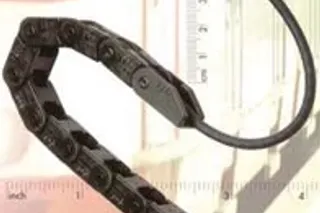Change Language :
Example 4: tested, tested, tested! CF98 with < 4xd!

For users of very small energy chains and the usually very tight bend radius associated with them, the question of suitable cables has arisen in the past, often with very high stroke rates.
Copper quickly reaches its physical limits with a bend radius of less than 5xd, making it necessary to search for suitable replacement conductor materials or fundamentally different conductor structures.
Test series with different conductor structures and materials should provide clarity as to how cables must be manufactured that can safely withstand several million bends in e-chain® even with a bend radius of less than 4xd.
Experimental setup: Horizontal short travel
Test parameters
travel:
S = 0.8 m
Speed approx:
V = 1.5 m/s
Acceleration approx:
a = 0.5 m/s2
Radius approx:
18 mm
Conductivity of alloys

However, the excellent mechanical specifications of the alloy are accompanied by reduced conductivity compared to copper, which is compensated for by slightly increased cross sections. The cross sections listed in the catalogue therefore correspond to the electrically defined cross sections, which are defined by the conductance. The conductor diameter of the alloyed conductor increases slightly compared to the conductor diameter of a copper conductor.
Although this compromise results in approx. 10% larger outer diameters for the CF98 series compared to a comparable CF9 type, the expected service life differences of the CF98 compared to the CF9 speak for themselves and increase many times over compared to other so-called chainflex cables.
Other features of the chainflex® CF98, as with the CF9 series, are the highly abrasion-resistant, cast-filled extruded PE outer jacket, the oil and UV resistance and the absence of PVC and halogens.
The igus®® cable offers increased operational reliability, particularly in areas of application that only have limited installation space but require a high number of strokes, and can be used in the semiconductor and assembly industry, the automation sector and in the automotive and banking sectors. There are new potential applications in automatic doors for vehicles and trains as well as in automatic food self-service machines and the packaging industry.
More information about chainflex® cable
Consulting
I look forward to answering your questions
igus® (Pty) Ltd. +27 11 312 1848Write e-mail
Shipping and consultation
In person:
Monday to Friday from 7 am - 8 pm.
Saturdays from 8 am- 12 pm.
Online:
24h
WhatsApp-Service:
Montag – Freitag: 8 – 16 Uhr

